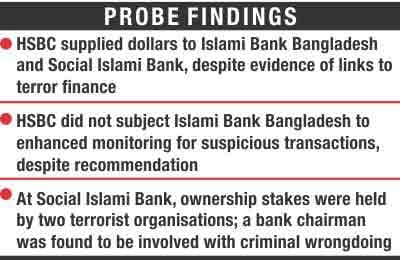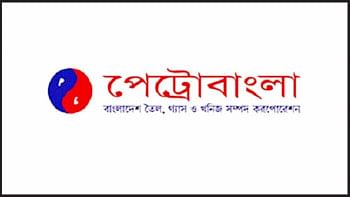Terror financed due to HSBC failure

Islami Bank Bangladesh Ltd and Social Islami Bank Ltd came into the spotlight yesterday for their alleged links to terrorist financing after a US Senate report exposed British banking giant HSBC's internal governance failure to control flows of suspect funds.
Click here to read Full Text of US report
One of the banks was allegedly funding al-Qaeda, and Osama bin Laden's brother-in-law held shares in a company that has shares in the bank.
In all these cases, profit motive rather than cautions from various levels within the bank and standard procedures ruled the game.
More thoughts were given to the bank's making $47,000 in revenue that might go up to $75,000 a year later than to the terrorist links the banks allegedly had, or the US authorities' view of the banks.
A report of the US Senate Permanent Subcommittee on Investigations, a congressional watchdog panel, has revealed these troubling information which show a “pervasively polluted” culture at HSBC Holdings Plc.
The bank acted as financier to clients seeking to route shadowy funds from the world's most dangerous and secretive corners, including Mexico, Iran, Saudi Arabia and Syria, according to the report.
The US report also mentioned that Al Rajhi Bank, a Saudi bank, was involved in suspicious transactions.
HSBC apologised to the US Senate, saying it takes “compliance with the law, wherever it operates, very seriously”.
In one instance, when Islami Bank wanted to open a US dollar account with the HSBC US office, questions were raised about the Saudi bank Al Rajhi's 37 percent ownership in Islami Bank. Ears of HSBC's anti-money laundering unit were cocked.
But the then head of HSBC Global Banknotes, Chris Lok, felt that his interest in considering a new account depended upon whether there was enough potential revenue to make.
“Is this an account worth chasing….How much money can you expect to make from this name? It's just that if the revenue is there then we are prepared for a good fight,” he wrote. “The money is there and we should go for this account.”
“Then Lok and others approved the account despite questions about its [Islami Bank] primary shareholder Al Rajhi Bank, whose past links to terrorist financing had received attention in the media …and troubling information about Islami Bank itself,” the senate report said.
HSBC's own Financial Intelligence Group (FIG) unit had reported that Shaikh Abdur Rahman, chief of Bangladesh's terrorist outfit JMB, had an account with Islami Bank. Bangladesh Bank found that two branches of Islami Bank had been engaged in “suspicious transactions” and urged the bank to take action against 20 bank employees for failing to report the suspicious transactions, according to the FIG report.
Six top militants including JMB chief Abdur Rahman and his deputy Siddiqul Islam alias Bangla Bhai were executed for killing two Jhalakathi judges in 2007.
HSBC's Know Your Customer unit had reported that Islami Bank be classified as a highest risk client but HSBC rejected the suggestion. It meant HSBC did not subject the bank to any enhanced monitoring.
HSBC's another internal report said a Saudi NGO, International Islamic Relief Organisation (IIRO), had been implicated in terrorist financing by the US government and included on the list of those prohibited to do business in the US. The IIRO had accounts with both Islami Bank and Social Islami Bank, and yet HSBC's Compliance Department denied an internal request of due diligence on the bank.
“Today, although HSBC exited the US banknotes business in 2010, Islami Bank remains a customer of two dozen HSBC affiliates,” the report said.
Similarly on Social Islami Bank, the HSBC's internal report said two shareholders of the bank -- the IIRO and Islamic Charitable Society Lajnat al-Birr Al Islam -- had alleged links to terrorism.
“IIRO has also reportedly funded al-Qaeda directly as well as several of its satellite groups. Osama bin Laden's brother-in-law Mohammad Jamal Halifa headed the Philippine branch of the IIRO,” said the FIG's internal report.
While the FIG cautioned about opening an account of Social Islami Bank, it failed to inform HSBC that Lajnat al-Birr, whose original name is Benevolence International Foundation, was designated by the US as a “financier of terrorism” with whom US persons are prohibited from doing business.
There were debates within HSBC about whether to open an account of Social Islami Bank, and yet the account was finally opened.
The FIG of HSBC also cautioned the bank about keeping Social Islami Bank as a client, an advice ignored by the British bank.
According to the US report, HSBC Bank USA, the US affiliate of the Asia-focused bank, supplied US dollars to Islami Bank and Social Islami Bank despite evidence of their links to terrorist financing.
The report, prepared by a team led by Senator Carl Levin, said in the case of Islami Bank, the factors included substantial ownership of the bank by al Rajhi, the central bank's fines for failing to report suspicious transactions by militants, and an account provided to a terrorist organisation.
And in terms of Social Islami Bank, the factors included ownership stakes held by two terrorist organisations whose shares were exposed but never sold as promised, and a bank chairman found to be involved with criminal wrongdoing.
The report said Al Rajhi Bank was associated with Islami Bank Bangladesh that provided an account to a Bangladeshi who had been accused of involvement in a terrorist bombing.
Islami Bank was fined three times for violating the anti-money laundering requirements in connection with providing bank services to “militants.”
Al Rajhi Bank provided a correspondent account to Social Islami Bank, whose largest single shareholder had been the IIRO for many years.
A second shareholder was the precursor to the Benevolence Islamic Foundation, also later designated by the US as a terrorist organisation, said the report.
In a statement on Monday, HSBC said, "We will acknowledge that, in the past, we have sometimes failed to meet the standards that regulators and customers expect. We will apologise, acknowledge these mistakes, answer for our actions and give our absolute commitment to fixing what went wrong.
"We have learned a great deal working with the Subcommittee on this case history and also working with U.S. regulatory authorities, and recognise that our controls could and should have been stronger and more effective in order to spot and deal with unacceptable behaviour.
"We believe that this case history will provide important lessons for the whole industry in seeking to prevent illicit actors entering the global financial system."
The bank said with a new senior leadership team and a new strategy in place since last year, the HSBC Group has already taken a number of concrete steps to augment the framework to address these issues including significant changes to strengthen compliance, risk management and culture.

 For all latest news, follow The Daily Star's Google News channel.
For all latest news, follow The Daily Star's Google News channel. 



Comments